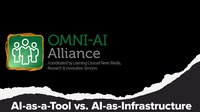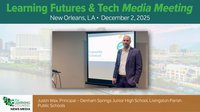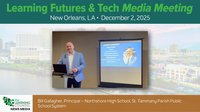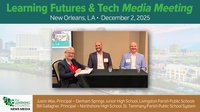Students who engage with a global community of learners are better prepared for success in life and work. They’re exposed to a broader and more diverse array of cultures and perspectives, and they develop qualities that are highly valued among employers, such as empathy and global understanding.
This is an area where online learning really excels. By connecting students with teachers and peers from around the world, online learning helps develop global competence among students.
Global competence refers to the skills, attitudes, and behaviors needed to thrive in a complex and ever-changing world. As defined by the Asia Society, globally competent students are curious about the world around them. They’re aware of other cultures and perspectives, and they can communicate effectively with diverse audiences.
According to the Longview Foundation, global competence is included in at least 11 states’ educational standards. It’s also featured in the “Portrait of a Graduate” that many school systems have developed.
There are many compelling reasons for students to learn global competence. For instance, the world is becoming smaller and more interconnected every day. Actions that happen here in the United States affect citizens worldwide, and vice versa. Technology and global commerce have brought the nations of the world together, and isolationism is no longer practical or possible.
The world’s citizens also face complex global challenges that affect us all to some degree, such as poverty, hunger, climate change, and environmental sustainability. These challenges will require global citizens to work together to find solutions, and this collaborative problem solving is facilitated by global competence.
Globally competent students are able to communicate and empathize with others from around the world. This is an increasingly desirable skill that employers are looking for in new hires. In today's globalized economy, companies of all sizes and in all industries are expanding their operations into international markets, and employees must be able to work with and relate to people from other cultures and societies.
As the nonprofit organization Digital Promise observes: “As students prepare to enter today’s workforce, it is vital that they develop global competence and the ability to interact and collaborate with people from diverse backgrounds.”
Bringing diverse students together
For students in large school systems, especially in urban areas, exposure to people from different cultures and nationalities often isn’t a problem. But students in rural or isolated areas might have fewer opportunities to experience global connections in their daily interactions with others. Online learning offers an ideal solution.
For example, teachers can use instructional technology to connect students with their peers and subject matter experts from around the world. Bringing outside voices and perspectives into the classroom can be an invaluable way for students to exchange points of view, learn about other nations and cultures, and develop an appreciation for those who might be different.
Having students take online classes with their peers from around the world is a powerful way to develop global competence.
When students are immersed in a global online classroom, they have opportunities to collaborate on projects and discuss and debate important ideas with other students worldwide. In the process, they broaden their own perspective, learn how to work well with others from different backgrounds, improve their problem-solving skills, and even develop global friendships.
In supplemental online courses, students from all around the world find a diverse and supportive community of peers as they engage in collaborative learning. These courses offer more than 250 unique online courses in the arts, world languages, humanities, and STEM-related subjects to students is 44 US states and 54 countries. Students worldwide can take these online courses for credit, as part of their regular school day. The courses are highly interactive, with students learning both with and from their peers every day
Global competence is essential for success in work and in life. The best way for students to learn this skill is by working alongside their peers from different nations and cultures—and supplemental online learning is an ideal way to provide this opportunity.
About the author
Carol DeFuria is the President and CEO of VHS Learning, a nonprofit provider of full-time and supplemental online instruction for high school students for nearly 30 years.











